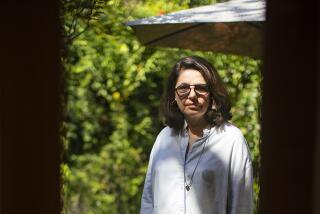Debut Album Presents Sofia Shinas Reconnected With Her Funky Soul
- Share via
The sound of soul and funk had come floating across the border to Windsor, Ontario, just 30 minutes away from Detroit’s pop radio stations. That was back when Sofia Shinas was listening to someone calling himself the Electrifying Mojo spin records by James Brown and Rufus and Aretha Franklin and others, helping the young Canadian escape the endless hours of her brothers’ Jimi Hendrix records and the contemporary Greek music of her parents.
That early heavy soul experience remains Shinas’ musical core, and it is what ultimately led to the smooth dance/pop/funk of her just-released “Sofia Shinas” album on Warner Bros. Records. Now transplanted to West Los Angeles, the singer and lyricist arrived at this sound after some years of experimenting in other genres, from high school rock bands to work in hometown musical theater.
“I always knew that this was what I wanted to do,” said Shinas, sitting with an iced tea at a Beverly Boulevard coffeehouse last week. “Even when I was in a band, I wanted to be the front woman, and sing my own lyrics, instead of having someone else sing my words. I’m just a medium through which I express my music.”
Shinas, 25, was pausing during a long day of preparations for an upcoming promotional concert tour to the East Coast. She had just arrived from a choreography rehearsal, re-enacting her brief days on a Detroit television dance program.
Her debut album was recorded in Los Angeles and New York, with her songwriting partner Mitch Kaplan co-producing with Daniel Abraham. A veteran pianist and musical director for such acts as the Pointer Sisters, Sister Sledge, Chaka Khan, comedian Sandra Bernhard and others, Kaplan had met Shinas at a New York production of Bernhard’s stage show and persuaded the young singer to move to Los Angeles about two years ago.
“And I’ve been working with him all along,” she said. As before, several of the new record’s tracks were fashioned out of Shinas’ lyrics and Kaplan’s musical ideas. Against a largely upbeat backdrop of rhythmic pop, Shinas sings lyrics that Rolling Stone has said describe a place “where everything does turn out fine.” But the singer herself insisted that her intentions are to go beyond the universal themes of romance to world events and personal freedoms.
Her “Soldier Boy” was written in response to the Persian Gulf War. “I’d gotten a phone call from my brother during that crisis, and he’d said, ‘Look what’s going on. Can you believe it’s happening, and how sad and painful it is that these people have to go away?’
“And I imagined this scenario about my brother or someone very close to me leaving. I wanted to write it from a family’s perspective, rather than a lover’s perspective, and take myself to that place. It’s quite tragic.”
She had suffered a different kind of family crisis when her parents strongly objected to her undertaking a musical career. “My parents were very strict and disciplinarian,” she said. “They wanted me to pursue academics. Much to their dismay, I didn’t.”
Shinas left the University of Toronto before finishing her first semester, to pursue making music in New York City.
“They were completely frantic, very unhappy,” she said. “My father didn’t speak to me for six months. He was so unhappy that I was no longer living my life the way he wanted me to. It was either my sanity or him. I tried to find a middle ground, but I had to be true to myself, and not betray myself.”
It’s a goal that may be best reflected in her song “Under the Tulip Tree,” in which Shinas sings “about a secret place I had as a child that I would go to and just fantasize about being grown up and being in control, because I certainly wasn’t in control of my life.”
The singer said she has long since reconciled with her father, and she has fond memories of the contemporary Greek music she grew up listening to at home. “It’s music that was soulful but in a different language,” she said. “The most beautiful music that I’ve ever heard happens to be Greek music, because they sing with such pain. It’s so poignant. They really sing from the gut.”
More to Read
The biggest entertainment stories
Get our big stories about Hollywood, film, television, music, arts, culture and more right in your inbox as soon as they publish.
You may occasionally receive promotional content from the Los Angeles Times.











